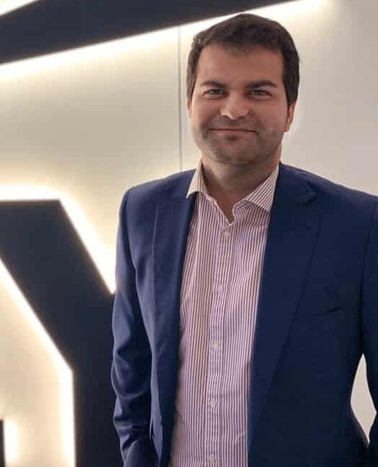
Francisco M. Sánchez Castro
Although Francisco holds a degree in Business Administration, he decided to follow his passion and take the plunge into the world of tax advice with IE Law School’s Máster en Asesoría Fiscal (LL.M.) Thanks to his IE journey, Francisco has seen firsthand how choosing such an advanced and innovative program has helped in his budding professional career.
In this interview, Francisco tells us about how IE’s cutting-edge teaching methods have pushed him to transcend the limits of theoretical knowledge to develop real-world skills and become a lawyer clients can trust. He also shares the new-found abilities which have had an impact on his ongoing work with large-scale operations at EY.

"What most stands out for me about the Master is the teaching methods they use, and the skills I’ve now gained. My approach to analyzing my clients’ technical questions is what makes me stand out, keeping me one step ahead of everyone else."
Why did you decide to study a Master at IE Law School?
My decision was mainly based on advice that I got from my indirect taxation professor when I was doing my business administration degree. I met with him to talk about specializing in tax law and ask his opinion on whether I should do a master’s. He had taken this program a few years earlier and recommended it to me. He told me that it had been very useful for him, and that he really enjoyed the teaching methods they applied.
What stands out from your experience, both professionally and personally, at IE Law School?
Mainly, the approach to teaching, which I found to be completely different than other teaching methods I’ve encountered during my educational career.
For me, this is key to IE Law School. Not only do their methods cover technical aspects taught by highly experienced professionals, but it also includes a practical element that allows students to gain the tools and analytical skills needed to take on any case. This aspect makes the program stand out, and it positively impacts the development of your professional career.
As for my personal development, I spent a lot of time with my classmates during the 10-month program. Throughout that time, we shared several goals, such as learning everything we could, finding the best solutions to problems and building a team that stays strong in the face of adversity (which was never anything more than a heavy workload).
Are there any stories you’d like to share?
The week before our first oral exam is a good memory of mine, and it’s probably an accurate reflection of how my personal and professional lives came together during my time at IE. After 6 months in the program, some of us started meeting every morning at 8:30 to talk about the practical cases that we would be asked to examine, sharing our concerns and debating the most important technical aspects. In my opinion, this is an example of something that stays with you, even after you’ve completed the program.
What was the most valuable lesson you learned in the program and do you apply it to your professional life today?
As I’ve said, what most stands out for me is the teaching methods they use, and the new skills I��’ve now gained. My approach to analyzing my clients’ technical questions is what makes me stand out, keeping me one step ahead of everyone else. However, learning to defend my ideas and present conclusions was also a very important part of the program for me. At IE we discuss each case in class in front of our professor and classmates. We also have to be able to clearly and coherently demonstrate our knowledge in oral exams.
This last point is hugely related to the demands of professional life. Although the client requires a memorandum with a very detailed technical analysis, what’s really valuable is the lawyer’s, or the counselor’s, professional capacity to explain those particularly complex questions in a practical, concise, accessible manner.
Do you believe that IE delivers a global and comparative vision of law?
Absolutely. There are master’s in tax law that focus too much on tax legislation and, in my opinion, neglect other subjects like European law, civil and commercial law, or accounting. As tax advisors, we come to realize in our daily professional lives that these subjects are essential for building our skills and abilities, and to develop our knowledge in these areas at the start of our career.
What are your professional goals?
My main goal is to be a good tax advisor and to have my clients recognize me as such. I would also like to become a partner one day, not because it’s really the only possible career path, but because if you’re working at one of the Big Four, or for a large law firm, it’s important to be ambitious. This will help you to achieve your objectives more effectively.
What do you enjoy the most about your profession?
My favorite part is going to work every day and not knowing what I’ll come up against. I am also aware that my tasks will change every year, and that I’ll have to relearn how to manage the new responsibilities given to me. There’s no comfort zone.
What advice would you give to future lawyers?
To keep an open mind. We hear the phrase “think outside the box” so often nowadays, and we might not take it that seriously. However, I think that it’s important that we all understand how to incorporate this concept into our different sectors. When it comes to the legal profession, I think this mantra gives us the opportunity to reflect on the ongoing changes in the profession. For example, we should consider how areas like tax digitization will force us to rethink our way of working and adapt to these new opportunities to achieve better results.
Did not having a bachelor’s in law cause you any problems during the program?
Absolutely not. IE developed an alternative course for students with no specific legal training, so that we’d be able to grasp the core subjects like civil, commercial, European or administrative law. These subjects are essential for tax advisors.
How did the program help you to access the job market, especially when it came to EY?
My bachelor’s degree isn’t from one of Spain’s most prestigious universities , so I think it would have been very difficult, if not impossible, to secure this opportunity at EY without having done a Master’s at IE. The program hasn’t just taught me about tax law, it has also given me the opportunity to develop and showcase my skills to my teachers, who are the partners at some of Spain’s top law firms.
Tell us about your professional experience in New York
The experience was incredibly enriching. I had the opportunity to work (and share the occasional beer) with people from all over the world. I’ll never forget it!
Is the working culture different there?
It’s very different. American clients rely heavily on their advisors. In the US, most of the advising work happens on the phone or in a brief email, and then a memorandum would be drawn up. In addition, customers wanted their lawyers to discuss their conclusions, so that they could discuss the issues at hand and ask new questions.
Did you ever imagine that someday you would be advising clients on such important, high-level issues?
It had never really occurred to me. I think that’s mainly because I didn’t have any friends in this kind of role to ask about their experience. Also, when I started working, I wasn’t entirely aware of how important the projects I worked on really were. At the end of the day, I was just focused getting the job done well, without thinking too much about the project in a broader context. However, at the end of one project, I looked back and realized how significant my work had been. It was surreal to see how certain projects I had worked on were talked about in the media. It was honestly a very rewarding experience, and looking back on it will always give me a thrill.